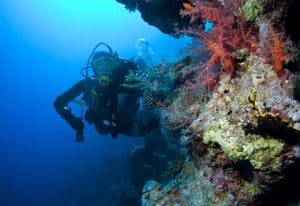Best Colleges for Marine Biology Around the World
Marine biology is a captivating field that offers budding scientists an opportunity to delve into the mysteries of life underwater. Its scope extends from microscopic plankton to the largest whales, encompassing everything that resides between the high tide mark and the deepest ocean trenches. This comprehensive branch of biology demands extensive knowledge, practical skills, and access to suitable colleges with marine biology programs to guide bright minds toward nurturing the oceans.
With myriad colleges worldwide offering programs in marine biology, it can be challenging to single out the colleges that align seamlessly with your career aspirations in this fascinating field.
Understanding Marine Biology as a Career
Marine biology entails the study of various organisms in the ocean, their behaviors, and interactions with the environment. This field of science is not just about the love for oceans and marine life, but it’s a commitment to exploring the unknown and contributing to the conservation of marine ecosystems.
When delving into the world of marine biology, one must be prepared for a journey that involves both excitement and challenges. The ocean’s vastness presents endless opportunities for discovery, yet it also poses obstacles that require dedication and perseverance to overcome.
A deep curiosity drives marine biologists to unravel the mysteries of the underwater world and a passion to protect and preserve it for future generations.
The Importance of Marine Biology
Marine biology is crucial in understanding the vast biodiversity that inhabits the earth’s waters. By studying the intricate web of life beneath the waves, scientists gain insights into the delicate balance that sustains marine ecosystems. This knowledge is not only vital for the well-being of marine species but also for the overall health of our planet.
Through their research and findings, marine biologists contribute to the development of strategies to uphold the ecological balance, safeguard endangered species, and combat the detrimental effects of climate change on aquatic ecosystems. Their work extends beyond the realm of science, as it has the potential to impact and influence global efforts to preserve our marine biodiversity significantly.
Furthermore, a marine biologist’s work touches upon various essential areas like resource management, environmental consultancy, and biomedical research. Their expertise is sought after by governments, conservation organizations, and industries that rely on the sustainable use of marine resources.
Therefore, the societal importance and contribution of marine biologists should never be underestimated.
Skills Needed for a Successful Marine Biology Career
Success in this field is hinged not just on the passion for oceans but also on the possession of specific skills. Marine biologists must be equipped with problem-solving abilities to tackle the complex challenges they encounter during their research. They must possess effective communication skills to convey their findings to scientific and non-scientific audiences, as public awareness and understanding are crucial for conservation efforts.
An understanding of scientific methods and principles is fundamental, as marine biologists rely on rigorous experimentation and data analysis to draw meaningful conclusions. Fieldwork skills are also essential, as they often involve collecting samples, conducting surveys, and observing marine life in its natural habitat.
Additionally, processing and analyzing data using statistical techniques is vital for drawing accurate conclusions from research findings.
While a strong foundation in biology is essential, marine biologists can benefit from an additional background in chemistry, physics, and math. These disciplines provide a broader understanding of the physical and chemical processes that shape marine ecosystems and influence the behavior of marine organisms.
Marine biologists must also be physically fit for field and lab work, as their research often involves long hours spent in challenging environments. Good diving skills are necessary for underwater exploration, and proficiency in operating research vessels is crucial for conducting surveys and collecting data at sea.
Adaptability and resilience are also essential traits, given the demanding nature of this line of work, which often requires extended periods away from home and working in remote locations.
In conclusion, a career in marine biology offers a unique opportunity to explore the wonders of the ocean while contributing to the conservation and sustainable management of marine ecosystems. It requires a combination of passion, scientific expertise, and a commitment to making a positive impact on the planet’s future.
Factors to Consider When Choosing a Marine Biology College
Selecting the ideal college for your marine biology studies involves making a significant decision. This choice will determine where you’ll spend the next few pivotal years of your life, where you’ll learn, grow, and possibly lay the foundation for your future career. Here are some key factors to consider when choosing a marine biology college.
Accreditation and Reputation
The accreditation of the institution is a major consideration. Ensure relevant educational authorities recognize the college. An institution’s reputation can also be a good indicator of program quality. Checking rankings, reading reviews, and gauging alumni success can give valuable insights into the institute’s standing.
When it comes to marine biology, reputation is particularly important. Look for colleges with a strong track record in producing successful marine biologists. Colleges with marine biology programs often have established connections with research organizations, which can provide valuable opportunities for internships and future employment.
Course Curriculum and Specializations
A robust curriculum is crucial to your marine biology studies. Check if the coursework is comprehensive, covering both practical and theoretical aspects of marine biology. Moreover, if you have a specific area of interest, consider colleges that offer relevant specializations.
Specializations can range from marine ecology and conservation to marine mammal biology and fisheries science. By choosing a college that offers specializations aligned with your interests, you can tailor your education to focus on the specific aspects of marine biology that excite you the most. This can greatly enhance your learning experience and future career prospects.
Location and Fieldwork Opportunities
Marine biology isn’t confined to just classrooms and labs. An important part of your education will be hands-on experience and fieldwork. Consider colleges located near the coast for opportunities in marine exploration and research.
Colleges situated in coastal areas often have easy access to diverse marine ecosystems, providing ample opportunities for fieldwork and research. You’ll have the chance to study marine organisms in their natural habitats, conduct experiments, and contribute to ongoing research projects.
Additionally, proximity to the coast may also offer opportunities for internships and collaborations with local marine research institutions and organizations.
Furthermore, consider the climate of the college’s location. Marine biology often involves spending significant time outdoors, so a favorable climate can make your fieldwork experiences more enjoyable and productive.
Top Marine Biology Colleges in North America
North America boasts several colleges known for their robust marine biology programs. Ranging from the tropical shores of Florida to the cold coasts of Alaska, these colleges offer a diverse range of environments to study in.
Now, let’s explore some of the top marine biology colleges in North America.
Duke University
The United States is home to some of the most prestigious colleges with marine biology programs. One such institution is Duke University, which stands out with its Marine Lab located on the coast of North Carolina.
The Marine Lab provides students unparalleled access to the Atlantic Ocean and its diverse marine life. Students at Duke University have the opportunity to conduct hands-on research, study marine ecosystems up close, and gain valuable field experience.
Stanford University
Another notable institution in the United States is Stanford University, which offers rich Pacific coast marine ecosystems for practical study. Located in California, Stanford University provides students access to a wide range of marine habitats, including rocky intertidal zones, kelp forests, and sandy beaches.
The university’s marine biology program emphasizes interdisciplinary research and encourages students to explore the complex interactions between marine organisms and their environment.
University of California, Berkeley
The University of California, Berkeley is also renowned for its marine program, leveraging the Bay Area’s diverse marine life. Located in close proximity to the Pacific Ocean, UC Berkeley offers students the opportunity to study a wide range of marine ecosystems, from the rocky shores of Northern California to the vibrant kelp forests of the Channel Islands.
The university’s marine biology program combines rigorous academic coursework with hands-on field experiences, preparing students for careers in marine research, conservation, and management.
Dalhousie University
When it comes to marine biology education in Canada, two leading institutions stand out. The first is Dalhousie University in Halifax, Nova Scotia. Situated on the Atlantic coast, Dalhousie University provides students with access to the rich marine ecosystems of the North Atlantic.
The university’s marine science program focuses on understanding the impacts of climate change, fisheries management, and marine conservation. Students at Dalhousie University can conduct research in collaboration with government agencies, industry partners, and local communities.
University of British Columbia
The University of British Columbia (UBC) is another renowned institution for marine biology in Canada. Located in Vancouver, British Columbia, UBC offers students a unique opportunity to study marine ecosystems from the Arctic to the Pacific. The university’s marine science program emphasizes interdisciplinary research and provides students with access to cutting-edge facilities, such as the Bamfield Marine Sciences Centre on Vancouver Island.
Students at UBC have the chance to study a wide range of marine organisms, from microscopic phytoplankton to majestic whales, and contribute to ongoing research efforts aimed at understanding and conserving marine biodiversity.
Renowned Marine Biology Colleges in Europe
Europe, home to numerous well-established research institutions, offers promising education opportunities in marine biology. The continent’s diverse coastal regions and rich marine ecosystems make it an ideal location for studying marine life and conducting research.
Let’s discover renowned marine biology colleges in Europe and explore their offerings.
Marine Biology Excellence in the United Kingdom
The United Kingdom stands out as a leading destination with several prestigious colleges with marine biology programs. The country boasts some of the world’s most renowned universities, offering excellent marine biology programs.
Students interested in the marine sciences often choose institutions like the University of Southampton and the University of St Andrews. These universities provide not only a strong academic foundation but also fantastic fieldwork opportunities around the UK coast and beyond.
Europe’s Leading Marine Biology Institutions
In addition to the United Kingdom, other European countries excel in marine biology education. Germany, for example, is home to the University of Rostock, which offers a unique study perspective on the Baltic Sea environment. Students at this institution can explore the diverse marine life thriving in the Baltic Sea and gain valuable insights into its ecological dynamics.
France is another European country with a strong presence in marine biology research and education. The Pierre and Marie Curie University, located in Paris, is renowned for its expertise in marine research. The university collaborates with multiple marine stations worldwide, providing students unparalleled opportunities to engage in cutting-edge research projects and gain international exposure.
Across Europe, marine biology programs emphasize hands-on learning and fieldwork. Students have the chance to participate in research expeditions, collect samples, and analyze data, enabling them to develop practical skills and deepen their understanding of marine ecosystems.
Furthermore, European colleges with marine biology programs often collaborate with research institutions, government agencies, and conservation organizations. These partnerships create a vibrant and dynamic learning environment, where students can engage with experts in the field and contribute to ongoing scientific endeavors.
Studying marine biology in Europe not only provides a solid academic foundation but also offers a unique cultural experience. Students can immerse themselves in the rich history and diverse traditions of the countries they study in, enhancing their overall educational journey.
In conclusion, Europe is home to renowned marine biology colleges that offer exceptional education and research opportunities. Whether exploring the UK coast, studying the Baltic Sea environment in Germany, or engaging in cutting-edge research in France, students can expect a comprehensive and enriching marine biology education in Europe.
Marine Biology Education in Asia and Australia
Marine biology education in Asia and Australia offers diverse opportunities for students to explore the underwater world and contribute to marine science and conservation. These regions are home to esteemed institutions and programs dedicated to nurturing the next generation of marine biologists.
Asian Universities Making Waves in Marine Biology
In the realm of Asian marine biology education, a few standout institutions have gained international recognition for their commitment to advancing the field. Among them, the National University of Singapore takes center stage as a global hub for tropical marine science.
With its proximity to diverse marine ecosystems in Southeast Asia, this university offers students unparalleled opportunities to delve into the rich biodiversity of the region’s waters.
Japan, with its rich maritime tradition, also plays a significant role in marine biology education. The University of Tokyo, for instance, offers students excellent research prospects in marine biodiversity and ecology. Aspiring marine biologists can explore Japan’s intricate coastal ecosystems and gain valuable insights into the complex interactions that occur beneath the surface.
Australia’s Role in Marine Biology Academia
Australia, blessed with natural treasures like the Great Barrier Reef and an array of other diverse marine ecosystems, stands as a beacon for those seeking to study marine biology.
The University of Queensland and James Cook University, in particular, have earned global acclaim for the quality of their marine biology programs. These institutions provide graduates with unmatched fieldwork experiences, offering the chance to explore some of the world’s most iconic marine environments.
Students can actively engage in research, collect data, and witness firsthand the wonders and challenges of marine ecosystems, all while contributing to our understanding and preservation of these critical environments.
In the quest to find the best colleges with marine biology programs worldwide, selecting the right institution can serve as the foundation for a fulfilling career in this field. Navigating this decision involves careful consideration of various factors and prioritizing what aligns best with your aspirations.
As you begin this journey, remember that the world of marine biology eagerly awaits your exploration, presenting numerous chances to make meaningful contributions to preserving our oceans and the enchanting creatures inhabiting them.
In this crucial decision-making process of selecting the right colleges with marine biology programs, AdmissionSight can be your invaluable guide. Our expert consultants specialize in college admissions, offering tailored guidance to align your goals with the ideal institutions.
From crafting compelling application essays to navigating the admissions process, AdmissionSight is committed to helping you pursue a successful career in marine biology.









































